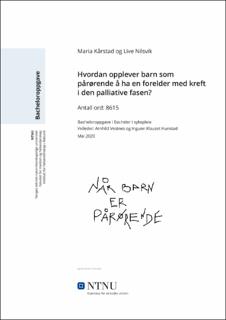| dc.contributor.advisor | Vestnes, Arnhild | |
| dc.contributor.advisor | Hunstad, Ingunn Klauset | |
| dc.contributor.author | Kårstad, Maria | |
| dc.contributor.author | Nilsvik, Live | |
| dc.date.accessioned | 2020-07-07T16:08:02Z | |
| dc.date.available | 2020-07-07T16:08:02Z | |
| dc.date.issued | 2020 | |
| dc.identifier.uri | https://hdl.handle.net/11250/2661230 | |
| dc.description.abstract | Bakgrunn: Barn som pårørende er et sårbart tema. Hvert år opplever rundt 4000 barn at en forelder får kreft. Brått blir hverdagen til barna snudd på hodet. Helsepersonell har som plikt å ivareta behovet et barn har for oppfølging når en forelder har en alvorlig sykdom.
Hensikt: Oppgaven har som hensikt å belyse hvordan barn opplever å ha en forelder med kreft i den palliative fasen.
Metode: En systematisk litteraturstudie inspirert av Forsberg og Wengström (2016).
Resultat: Barn har et behov for alderstilpasset informasjon og kommunikasjon,
støtte fra fagpersoner og pusterom i den tunge hverdagen. Fagpersoner trenger
økt kompetanse i hvordan håndtere barna for å kunne ivareta og støtte i
en slik situasjon. Konsekvenser som mistillit til omsorgen som gis,
fiendtlighet mot helsepersonell og misoppfatninger om diagnosen kan oppstå.
Flere studier viser at barna kan utvikle angst, depresjon og posttraumatisk
stress dersom de ikke blir informert og ivaretatt fra første stund.
Konklusjon: Økt kompetanse blant helsepersonell vil kunne bidra til at barna blir ivaretatt etter deres behov. Ved å alder-tilpasse informasjonen som blir gitt, tilrettelegge hverdagen med tanke på fritid, pusterom og skole, samt å sikre god oppfølging gjennom hele forløpet, bidrar vi til at barna håndterer å være pårørende bedre. | |
| dc.description.abstract | Background: Children as dependents is a vulnerable topic. Every year around 4000 children experience that either one of their parents gets cancer. Suddenly the everyday life of the children turns upside-down. Healthcare professionals have a duty to attend to the need a child has for follow-up when a parent has a serious illness.
Aim: The study´s purpose is to illustrate how children experience having a parent with cancer in the palliative phase.
Method: A systematic literature study inspired by Forsberg and Wengström (2016).
Results: Children need age-adapted information/communication, support from health care professionals and a breathingspace in the heavy everyday life. Health care professionals need increased competence in how to handle the children in order to look after and support them in such a situation. Consequences such as distrust in the care provided, hostility towards health care professionals and misconceptions about the diagnosis may arise. Several studies show that children can develop anxiety, depression and post-traumatic disorders, if they´re not informed and taken care of from the first moment.
Conclusion: Increased competence among health care professionals will contribute to the children being taken care of after their own needs. By age-adapting the information given, adapting the everyday life considering their spare time, breathingspace and school, and with good follow-up throughout, nurses can help the children to manage being dependents better.
| |
| dc.publisher | NTNU | |
| dc.title | Hvordan opplever barn som pårørende å ha en forelder med kreft i den palliative fasen? | |
| dc.type | Bachelor thesis | |
